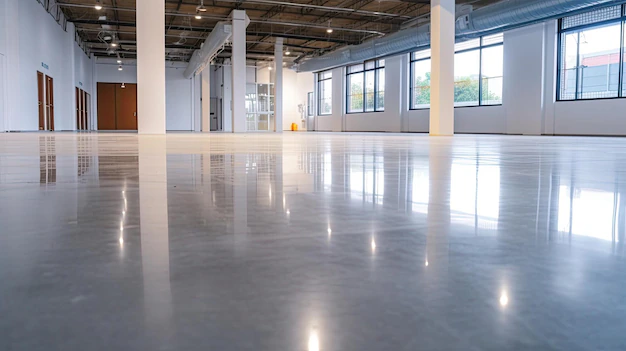
Having explored the many advantages of epoxy flooring in residential garages, it’s worth noting that epoxy’s benefits extend far beyond home improvement. Epoxy flooring for commercial applications has become a game-changer for businesses across various industries.
When it comes to flooring solutions for commercial spaces, the choice goes beyond aesthetics. While creating an appealing environment is crucial, functionality and durability are equally important factors. The seamless blend of aesthetic and functional epoxy flooring for commercial applications has gained significant popularity for a number of benefits. In this comprehensive guide, we will explore the world of epoxy flooring for commercial spaces, emphasizing its myriad advantages and highlighting its crucial role in creating visually captivating and highly practical environments.
Understanding Epoxy Flooring for Commercial Applications
Before delving into the specifics of why epoxy flooring is an ideal choice for commercial spaces, let’s start by understanding what epoxy flooring is and how it differs from other flooring options.
Epoxy flooring is a resilient and versatile solution created by applying multiple layers of epoxy resin to a prepared concrete substrate. It consists of several components, including epoxy resin, a hardening agent, and occasionally, decorative additives like flakes or metallic pigments. The resulting surface is characterized by its glossy finish, smooth texture, and exceptional durability.
Epoxy flooring stands apart from traditional flooring options like tiles, hardwood, or carpet due to its unique properties. It offers a seamless, monolithic surface that eliminates grout lines and joints, creating a clean and uncluttered appearance. This feature is particularly advantageous for commercial applications where hygiene and aesthetics play pivotal roles.
Aesthetic Benefits of Epoxy Flooring for Commercial Applications
1. Versatility in Design
Epoxy flooring for commercial applications presents a vast array of design possibilities. This versatility allows businesses to achieve their desired aesthetic, whether it’s a sleek, modern appearance for a high-end boutique or a vibrant, attention-grabbing design for a restaurant or retail store. Epoxy floors can replicate the look of natural materials like marble, granite, terrazzo, or even abstract art, offering endless creative opportunities.
2. Contemporary and Elegant Look
The glossy finish of epoxy flooring imparts a contemporary and sophisticated appearance to commercial spaces. The seamless surface eliminates grout lines and joints, creating a clean and sleek visual impression. This sleek look can make a significant impact on customers and clients, conveying a sense of professionalism and meticulous attention to detail.
3. Enhanced Light Reflectivity
Epoxy flooring’s high-gloss surface is highly reflective, which can significantly improve the overall lighting in a commercial space. This is particularly advantageous for businesses that rely on showcasing products or for offices aiming to create a bright and inviting atmosphere. Enhanced natural lighting can also contribute to energy efficiency by reducing the need for additional artificial lighting during the day.
4. Customization and Branding Opportunities
For businesses, branding is a critical aspect, and the flooring can play a pivotal role in reinforcing brand identity. Epoxy flooring can be customized with company logos, slogans, and specific color schemes, helping businesses create a cohesive and recognizable brand image. This branding opportunity extends to retail stores, where floor designs can guide customers and create immersive shopping experiences.
Functional Benefits of Epoxy Flooring for Commercial Applications
1. Exceptional Durability and Longevity
Epoxy flooring is renowned for its remarkable durability. It can withstand heavy foot traffic, impacts from falling objects, and the wear and tear of daily use without displaying signs of deterioration. This durability translates to long-term cost savings, as businesses can avoid frequent floor replacements or repairs.
2. Chemical Resistance
Many commercial spaces, such as laboratories, industrial facilities, and restaurants, are prone to chemical spills and exposure. Epoxy flooring’s resistance to chemicals, including oils, solvents, acids, and alkalis, makes it an ideal choice for environments where such incidents are common. This resistance ensures that the floor remains unharmed and easy to clean.
3. Low Maintenance Requirements
Epoxy flooring is remarkably easy to maintain. Its smooth, non-porous surface prevents the accumulation of dust, dirt, and stains. Routine cleaning involves simple tasks like sweeping and mopping, making it a cost-effective and time-saving flooring option for commercial spaces.
4. Hygiene and Sanitation
In businesses that prioritize cleanliness and hygiene, such as restaurants, healthcare facilities, and laboratories, epoxy flooring excels. Its seamless surface leaves no room for bacteria, molds, or contaminants to hide, ensuring a sanitary environment. Epoxy floors can also be designed with an antimicrobial additive for added protection.
5. Slip Resistance for Safety
Safety is paramount in commercial spaces, particularly those open to the public. Epoxy flooring can be tailored to meet specific slip-resistance requirements, reducing the risk of accidents and falls. This is particularly important in areas with frequent water or spill exposure, such as restaurant kitchens or entrances.
Installation Process and Considerations
The installation of epoxy flooring for commercial applications is a crucial aspect of ensuring its long-term performance and functionality. Here are the essential steps involved in the installation process:
1. Surface Preparation
Proper surface preparation is paramount for a successful epoxy flooring installation. This involves thorough cleaning, removal of any existing coatings or contaminants, and surface profiling using methods such as shot blasting or diamond grinding.
2. Primer Application
A primer coat is applied to the prepared surface. The primer serves multiple purposes, including promoting adhesion between the epoxy coating and the concrete substrate and sealing the surface to prevent air bubbles from forming in subsequent layers.
3. Epoxy Coating Application
Once the primer has dried, the epoxy coating is applied. Depending on the desired finish and thickness, this may involve one or multiple coats. Epoxy coatings are typically rolled or squeegeed onto the surface, and special techniques can be employed to create decorative patterns or textures if desired.
4. Curing and Drying
After the epoxy coating has been applied, it requires time to cure and dry. The curing time can vary depending on the specific epoxy product used but typically ranges from 24 to 72 hours. During this time, the epoxy undergoes a chemical reaction that transforms it into a hard, durable surface.
5. Optional Topcoat
In some cases, an optional topcoat or sealer may be applied to enhance the epoxy’s durability and resistance to UV radiation. This step is especially important for outdoor applications or areas exposed to direct sunlight.
Conclusion
Epoxy flooring for commercial applications represents an ideal fusion of aesthetic appeal and functional benefits. Its versatility in design, contemporary appearance, and customizable branding opportunities make it an attractive choice for businesses aiming to create visually captivating spaces. Simultaneously, its exceptional durability, chemical resistance, low maintenance requirements, and safety features position it as a pragmatic and cost-effective flooring solution.
When considering flooring options for commercial spaces, consider Dogwood Epoxy to help you out. We are imperative to assess both the immediate aesthetic impact and the long-term functionality. Epoxy flooring checks both boxes, offering a durable, low-maintenance surface that elevates the overall ambiance of commercial environments. Whether it’s a trendy retail store, a bustling restaurant, a cutting-edge office, or an industrial facility, epoxy flooring for commercial applications is a versatile and enduring choice that seamlessly marries form and function.
